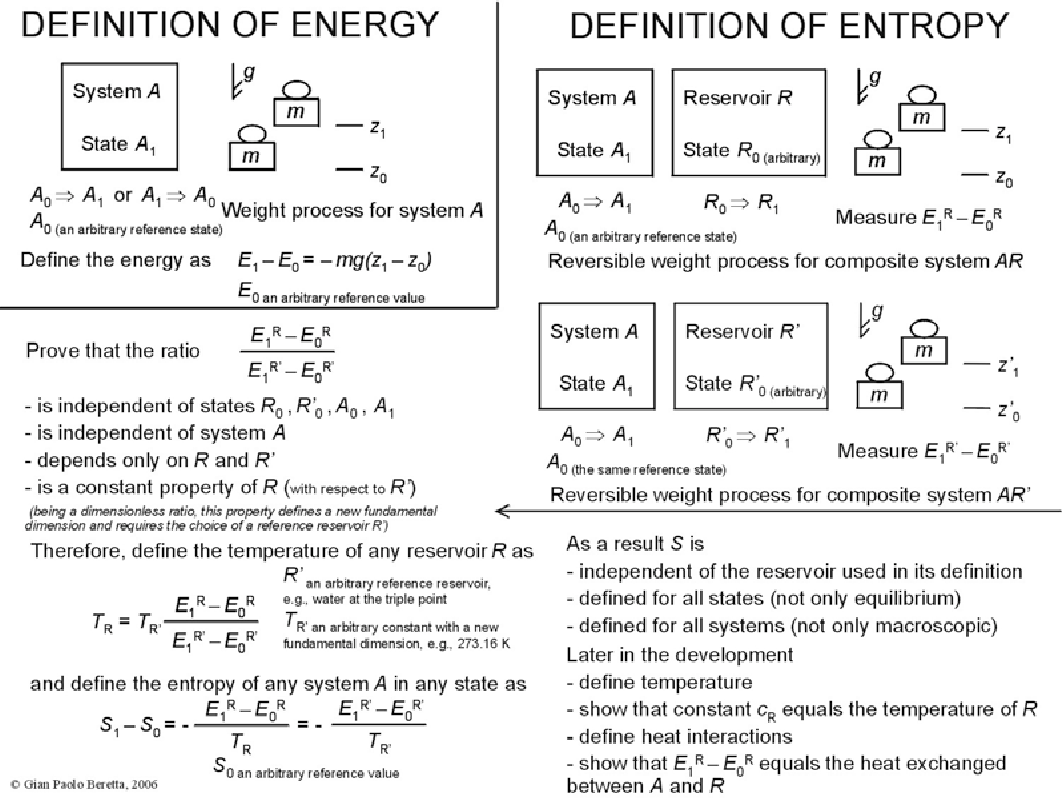

But perhaps it is possible but highly improbable. Macroscopically we know that heat will flow naturally from A to B because and not the other way, since we’ve never observed it. To simply further let them be solids in thermal contact. Let’s take our two bodies A and B but now assume they are not thermal reservoirs (i.e., temperatures can change). I’m not versant enough to assess your definition, but I can try to provide an association between the probabilities associated with microstates and the macroscopic definition of temperature that applies to the entropy definition of classical thermodynamics.Ĭlassical thermodynamics basically defines temperature (so called “kinetic temperature”) as the average random translational kinetic energy of the atoms/molecules of a substance. Your definition gets into the realm of statistical thermodynamics.
#ENTROPY DEFINE HOW TO#
Once again, temperature differentials occur and heat transfers occur with the gas.Ĭan I define entropy in the following manner "Entropy is a number that is associated with each macro state of a system and it's larger for macro states having numerous micro states (higher probability) and smaller for macro states that have fewer micro states (lower probability)"…” if this is correct, how to further associate this number with heat and temperature of a system?”

If the process is carried out too quickly, pressure differentials occur causing relative motion between layers of the gas resulting in viscous friction. In order for a process to be reversible, it must be carried out very slowly (quasi-statically) to minimize temperature and pressure differentials in the gas. We have already shown how heat transfer through a finite temperature difference increases entropy. The layer of gas transfers heat to inner layers of the gas and so on. Heat transfers from the surfaces to the layer of gas. The temperatures of these surface are now greater than the temperature of the layer of gas next to them. The motion between the piston and cylinder raises the temperatures of their surfaces much like when we vigorously rub our hands together to warm them up on a cold day. Friction between the surfaces of the piston and cylinder is dry friction. Consider an ideal gas in thermal and mechanical equilibrium in a cylinder fitted with a piston. The definition for entropy can account for the irreversibility, but to do so we must apply it to heat transfer that occurs internal to the system.įriction is an example of a source of irreversibility. But adiabatic processes can be irreversible. Since $Q$ is zero between the system and its surrounding one might conclude that there is no increase entropy. But it is a very good question because there are processes that do not involve heat transfer between a system and its surroundings (e.g., adiabatic work processes).

If you mean replacing $Q$ with $W$ in the definition, as far as I know the answer is no. However, since a finite temperature difference is always necessary for heat transfer to occur, all real processes are necessarily irreversible. In the limit, when the temperature difference approaches zero, the inequality approaches zero and the process is said to be reversible. The equality holds, and becomes the thermodynamic definition of $dS$, only for a reversible exchange of heat (let's indicate it as $dQ_<0$, in violation of the second law. Unfortunately, the following elaboration on the basic question introduces concepts (randomness, microstates, probability) which are external to the realm of thermodynamics and pertain to statistical mechanics.Īt variance with ideas conveyed sometimes at introductory level, statistical mechanics aims to reproduce the thermodynamic behavior of equilibrium systems, but it is neither a generalization, nor a justification of thermodynamics, although it may provide a clarification for many thermodynamic concepts.Ĭoming to the formula connecting differential of entropy ( $dS$), exchanged heat ( $dQ$) and absolute temperature ( $T$), the first observation is that in general is not true that $dS=dQ/T$. It seems to me that the question in the title is crystal clear, referring to the thermodynamic definition of entropy.


 0 kommentar(er)
0 kommentar(er)
